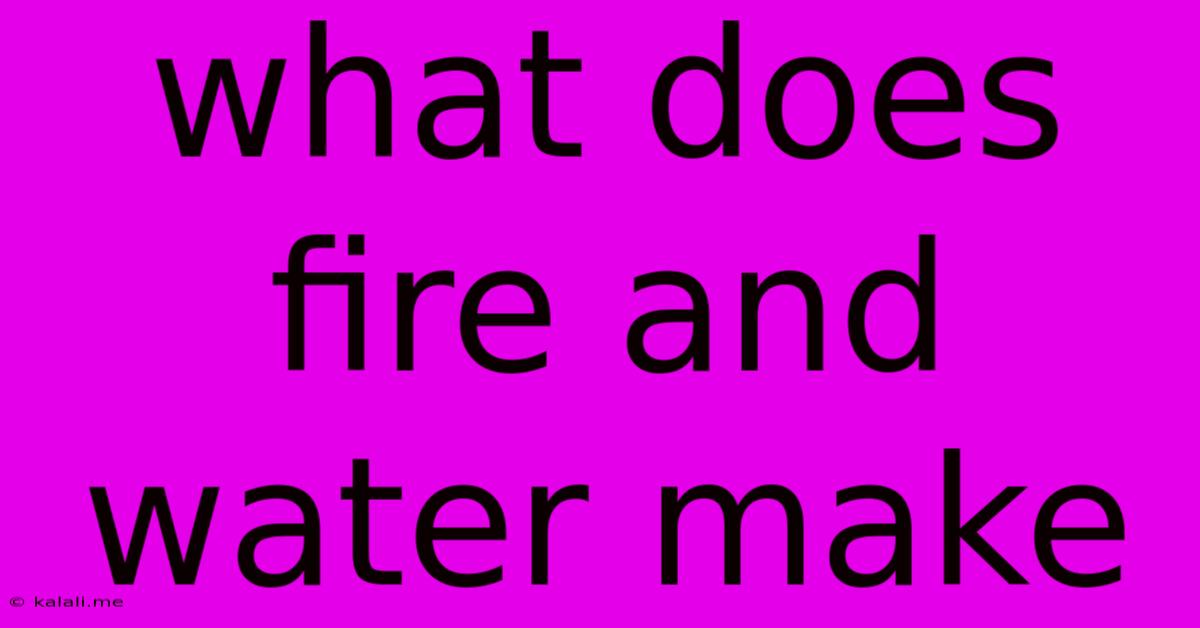What Does Fire And Water Make
Kalali
Jun 04, 2025 · 3 min read

Table of Contents
What Does Fire and Water Make? More Than Just Steam!
This seemingly simple question, "What does fire and water make?", unlocks a fascinating exploration of chemistry, physics, and even a touch of mythology. While the immediate answer might seem to be steam, the reality is far more nuanced and interesting. This article delves into the various reactions and outcomes of combining fire and water, examining the science behind the seemingly simple interaction.
The most obvious result of combining fire and water is, of course, steam. The heat from the fire causes the water to evaporate, transforming it into water vapor. This is a phase change, a physical change rather than a chemical one. The water molecules themselves remain unchanged; they simply transition from a liquid to a gaseous state. However, the interaction is far more complex than this simple transformation. The amount of steam produced depends on several factors, including the temperature of the fire, the volume of water, and the surrounding atmospheric conditions.
Beyond Steam: The Chemistry of the Interaction
While the phase change to steam is the most visible effect, the interaction between fire and water involves several other chemical and physical processes.
-
Extinguishing the Fire: This is arguably the most significant effect. Water extinguishes fire primarily by cooling the burning material below its ignition temperature. The heat energy from the fire is absorbed by the water during the phase change into steam, effectively breaking the chain reaction that sustains combustion. Additionally, the steam produced displaces the oxygen needed for combustion, further hindering the fire's ability to burn. This is why water is such an effective fire suppressant.
-
Temperature Changes: The temperature of both the water and the surrounding environment is significantly affected. The temperature of the water increases as it absorbs heat from the fire, until it eventually boils and turns into steam. Conversely, the fire’s temperature decreases, ultimately leading to its extinguishment. The overall temperature change depends on the relative quantities of water and the intensity of the fire.
-
Potential Chemical Reactions: While less common, certain types of fires can involve chemical reactions with water. For example, some metals react violently with water, generating flammable hydrogen gas. This can create a hazardous situation, especially if an ignition source (like the existing fire) is present. Understanding the materials involved in the fire is crucial in determining the potential for such reactions.
The Symbolic Significance of Fire and Water
The interaction of fire and water holds a powerful symbolic meaning across various cultures and mythologies. Frequently representing opposing forces – destruction versus creation, passion versus calm – their interaction symbolizes transformation, balance, and the interplay of opposing energies. In many narratives, the combination of fire and water leads to a powerful new force, reflecting the transformative power of combining seemingly incompatible elements.
Conclusion: A Complex Interaction
The question of what fire and water make is far more intricate than a simple answer suggests. While steam is the most immediate and visible result, the interplay of physics and chemistry involved encompasses fire suppression, temperature changes, and even the possibility of additional chemical reactions. Understanding these complexities underscores the importance of carefully considering the interaction of these two powerful forces in various contexts, from fire safety to symbolic representation.
Latest Posts
Latest Posts
-
Can You Upload Without A Server
Jun 06, 2025
-
Can A Alternator Go Bad From Sitting
Jun 06, 2025
-
How To Tells Omeone You Want To Just Be Friends
Jun 06, 2025
-
Substitute White Flour For Whole Wheat Flour
Jun 06, 2025
-
Why Is The Word Stuff Funny To Use
Jun 06, 2025
Related Post
Thank you for visiting our website which covers about What Does Fire And Water Make . We hope the information provided has been useful to you. Feel free to contact us if you have any questions or need further assistance. See you next time and don't miss to bookmark.